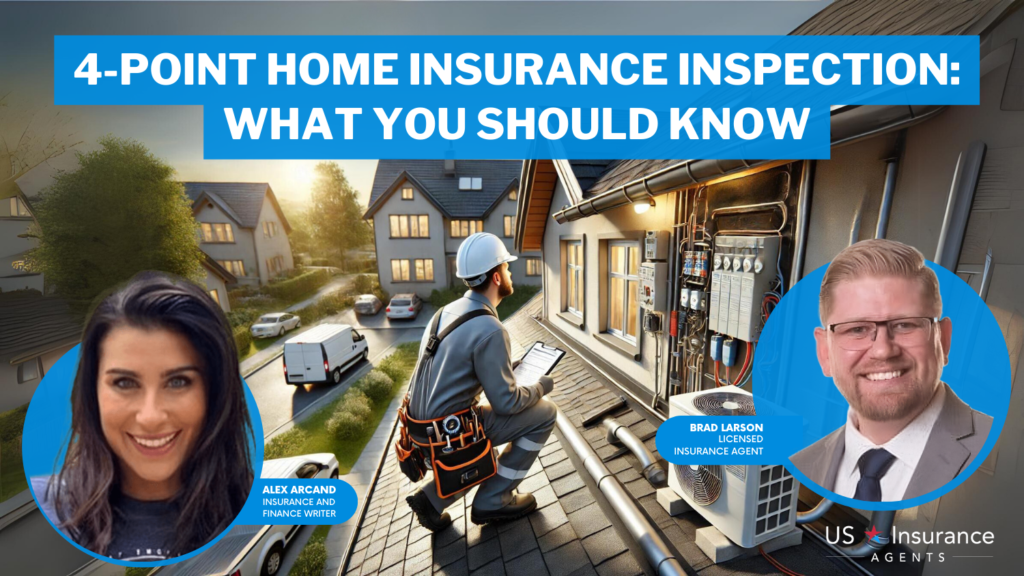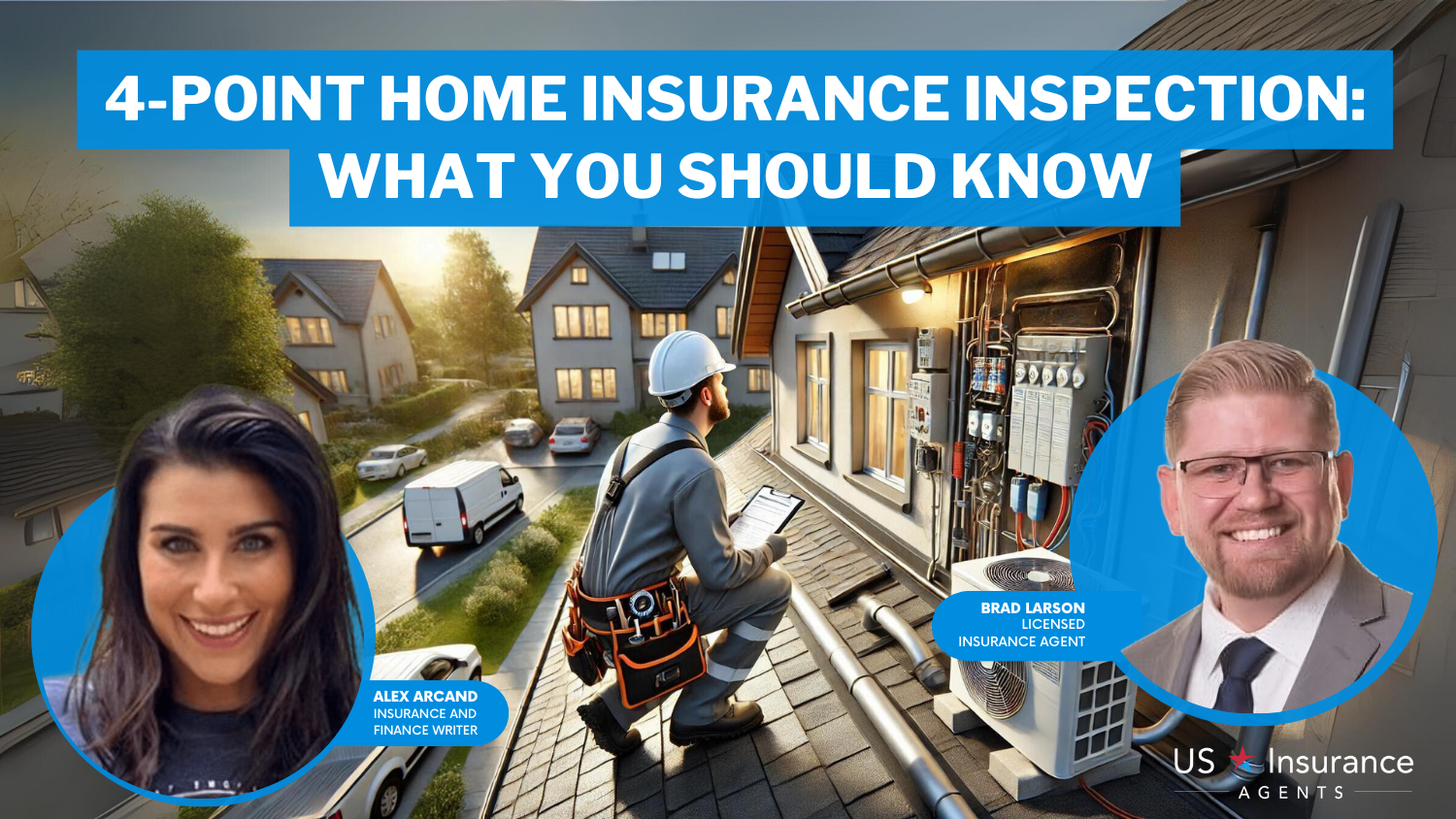4-Point Home Insurance Inspection: Everything You Should Know (2026)
What's a 4-point inspection? A check on your home's main systems: electrical, HVAC, plumbing, and roof. We'll detail the 4-point inspection meaning and cover the reasons for a 4-point home insurance inspection, including getting or renewing a homeowners insurance policy.
Read more Secured with SHA-256 Encryption





Table of Contents
Table of Contents


Insurance and Finance Writer
Alexandra Arcand is an outreach administrator and insurance expert located in North Central Ohio. She has a passion for writing, investing, and education. As an insurance content writer for over three years, Alexandra has first-hand experience in business finance, economics, and real estate. She leads an outreach writing team that specializes in travel, real estate, healthcare, law, finance, an...
Alexandra Arcand


Sr. Director of Content
Sara Routhier, Senior Director of Content, has professional experience as an educator, SEO specialist, and content marketer. She has over 10 years of experience in the insurance industry. As a researcher, data nerd, writer, and editor, she strives to curate educational, enlightening articles that provide you with the must-know facts and best-kept secrets within the overwhelming world of insurance....
Sara Routhier


Licensed Insurance Agent
Brad Larson has been in the insurance industry for over 16 years. He specializes in helping clients navigate the claims process, with a particular emphasis on coverage analysis. He received his bachelor’s degree from the University of Utah in Political Science. He also holds an Associate in Claims (AIC) and Associate in General Insurance (AINS) designations, as well as a Utah Property and Casual...
Brad Larson
Updated January 2025
A 4 point inspection examines four major systems of a house or condominium, including roofing, plumbing, HVAC, and electrical.

Homeowners usually request a four-point inspection because an insurance company has requested it before renewing or issuing a homeowners insurance policy. This is particularly common for homes over 20 years old since they represent a higher risk to insurance companies.
Think of it like an auto insurance provider examining your vehicle as part of deciding if they want to insure you and how the insurance company determines your premium.
If you’ve been wondering, “Where can I find a provider of a 4-point inspection near me?“ rest assured that it is not difficult to locate one.
If you’re waiting on a four-point inspection, you should take the time to shop around for insurance quotes to find the best price and best home insurance for your home. Enter your ZIP code into our free tool if you would like to discover what quotes might look like for you.
- A 4-point inspection examines your HVAC, roofing, plumbing, and electrical systems for current and potential problems
- If you are trying to buy or sell a house or get an insurance policy for your home, a 4-point inspection can reassure you that your home is in good condition
- A 4-point inspection is affordable and fast
4-Point Inspection Meaning
What is 4-point inspection? 4-point inspections are integral examinations of some of the most critical systems of your home.
Your homeowners insurance covers issues with the structure of your home, so an inspection can protect the company from excessive claims. Insurance companies usually request an inspection for older homes. The older your home is, the more likely something will break down in the near future. Learn about the best homeowners insurance for older homes.
Therefore, a 4-point inspection helps an insurance company understand the financial risk of insuring your home. See more detail in our article, Before getting homeowners insurance, will the insurer require a home inspection?
After a 4-point inspection, you should be eligible for home insurance. Choosing a company that bundles home, auto, boat, and personal liability insurance into one convenient plan is one of 22 tips for how to get cheap home insurance. Learn more in our article, Can I bundle my car insurance with other policies?
It’s not merely for insurance companies, however. You can use a 4-point inspection to determine if a property is worth buying. It’s easy enough for a home seller to hide internal problems in a house long enough for you to purchase it.
However, a 4-point inspection will detect any problems hidden in a home so that you can make an informed decision.
Benefits of a 4-Point Inspection
Some states require a 4-point inspection, but even if you live somewhere that doesn’t, there are many benefits to getting a 4-point inspection performed:
- Guarantee the condition of your property – If you want to sell your home, an inspection will tell you everything that needs to be repaired before you proceed.
- Fast and relatively cheap – A licensed professional only requires a few hours to perform the inspection, and rates are relatively inexpensive.
- Avoid future problems – Prevention is the best cure, and a 4-point examination will let you know about anything that will require attention in the near future.
As you can see, there are many good reasons to getting a 4-point inspection. It can help make you better aware of and anticipate home-buying hidden costs.
Tracey L. Wells Licensed Insurance Agent & Agency Owner
Free Home Insurance Comparison
Compare Quotes From Top Companies and Save
Secured with SHA-256 Encryption
What a 4-Point Inspection Examines
What do they check in a 4-point inspection? The four systems that this inspection cover are electrical, plumbing, roofing, and HVAC:
- Electrical – This part of the inspection thoroughly examines the wiring of your home. Homes with aluminum, knob-and-tube, or copper wiring are often ineligible for insurance because of the increased risk of fire.
- Plumbing – The pipes of your home will be assessed for the risk of bursting. Homes with pipes made of polybutylene are at a higher risk of bursting and causing water damage.
- Roofing – Shingle or tile damage can be hard to notice until it’s severe. An inspector surveys the age, life expectancy, and material of your roof and can give you an idea as to whether or not you need to replace it soon.
- HVAC (heating, ventilation, and air conditioning) – Any home with air conditioning or central heating should have the system regularly scrutinized. Not only can it help you prematurely detect issues, but it will also prevent you from the inconvenience of losing your air conditioning or heat.
While this overview of the inspection is brief, your actual inspection will be quite thorough.
Electrical Inspection
One of the biggest aspects of the electrical inspection is ensuring that your wiring meets local code regulations. That means that all electrical outlets must be grounded, and the size of your wiring system should match your home.
Older homes are always at risk of not meeting codes. If an inspector finds something that isn’t up to code, you won’t necessarily fail the inspection, as long as it isn’t a severe problem. However, you might want to address the issue at some point.
There are, however, some electrical elements that will cause an insurance company to refuse your home coverage. These include a double-tapped breaker, cloth and sheath wiring, and bad fuses.
Read more: Home Features That Can Make Homeowners Insurance More Expensive
Plumbing Inspection
A licensed inspector will examine the age and material of your drains and supply lines for signs of leaking or issues that may turn into leaks.
An inspector will also scrutinize your water heater to ensure that hot water can be effectively distributed throughout your home.
Read more: Does home insurance cover plumbing?
Roofing Inspection
The roofing aspect of the inspection is the most thorough part of the examination, and for good reason. Your roof is one of the most essential parts of your home but one of the hardest things from which to detect impending damage.
Your roof not only supports the structure of your home but also affects mold accumulation and energy efficiency.
An inspector will survey your roof and provide you an assessment of its health. You’ll also get an idea of any safety issues that are on the horizon. Your inspector will likely recommend replacement if your roof is over 20 years old.
They will also evaluate it for signs of deterioration from weather and water and any problems with leakage.
Read more: Does home insurance cover roof leaks?
HVAC inspection
Your heating, ventilation, and air conditioning system is one of the most important systems in your house for your safety and comfort. If your HVAC system is installed incorrectly or outdated, your air quality will suffer.
While poor air quality or dust accumulation is uncomfortable, it can also lead to health problems.
Your inspector will ensure that your heating and cooling unit is the appropriate size for your home. They will examine the condition of your HVAC system and inform you of any impending problems. While your HVAC system might not have any issues, you should replace it every 20 years or so.
Read more: Does my homeowners insurance policy cover my HVAC unit?
How To Get a 4-Point Inspection
Getting a 4-point inspection is relatively easy — you simply call the inspector of your choice and schedule the exam.
Are you wondering, “How much is does a 4-point inspection cost near me?“ Prices vary by state and insurance company requirement, but you can expect to pay approximately $100 for the test.
After your exam is completed, the inspector will fill out a 4-point inspection form for your insurance company. This 4-point inspection report sample will provide the company with the necessary information to insure your home.
Once you have passed an examination, you’ll be ready to move on with whatever business you desire. If you’re trying to sell your home, having the results of a 4-point examination can reassure potential buyers that your home is safe.
Likewise, you’ll know that a home is worth purchasing if the owner can disclose that the house passes the inspection.
Finally, your insurance company will be more confident in providing you a policy after an inspection.
Read more: How long does it take to get home insurance?
Find the Best Insurance After a 4-Point Inspection
A 4-point inspection can help prepare you to buy or sell a house and give you what you need to obtain a homeowners policy. 4-point inspections are an inexpensive and quick way to ensure that your home is safe.
Following a 4-point inspection, you’ll be ready to shop around for home insurance quotes. Enter your ZIP code to determine what quotes might look like for you.
Frequently Asked Questions
What is a 4-point inspection?
A four-point inspection is a specialized assessment of the four main systems of a residential property: the roof, electrical, plumbing, and HVAC (heating, ventilation, and air conditioning) systems. It is commonly conducted for insurance purposes to evaluate the condition and age of these essential components.
Why is a 4-point inspection necessary for insurance?
Insurance companies often require a 4-point inspection to assess the risk associated with insuring an older property or one with outdated systems. It helps insurers determine the potential for future claims resulting from old or faulty components and allows them to adjust coverage and premiums accordingly.
When is a 4-point inspection typically required?
A 4-point inspection is typically required when insuring older homes, generally those that are 30 years or older. Some insurance companies may also request a four-point inspection for homes between 20 and 30 years old, depending on their underwriting guidelines.
What does a 4-point inspection cover?
During a 4-point inspection, a qualified inspector will evaluate the condition, age, and functionality of the roof, electrical system, plumbing system, and HVAC system. The inspector will examine these components, looking for any signs of damage, wear and tear, code compliance issues, or potential safety hazards.
How long does a 4-point inspection take?
The duration of a 4-point inspection can vary depending on the size and complexity of the property, as well as the thoroughness of the inspector. On average, it typically takes around one to two hours to complete a four-point inspection.
How long is a 4-point inspection good for?
It’s recommended to schedule a 4-point inspection every three to five years, depending on your home insurance company’s requirements or when an issue arises.
How do I find out who does a 4-point inspection near me?
For a home insurance inspection, the insurance company will send an insurance inspector.
For other types of 4-point inspections, simply do an online search for “four point inspection near me” to find several online sources in which you can input your address or just your ZIP code to find local inspectors, such as the International Association of Certified Home Inspectors.

Get a FREE Quote in Minutes
Insurance rates change constantly — we help you stay ahead by making it easy to compare top options and save.

